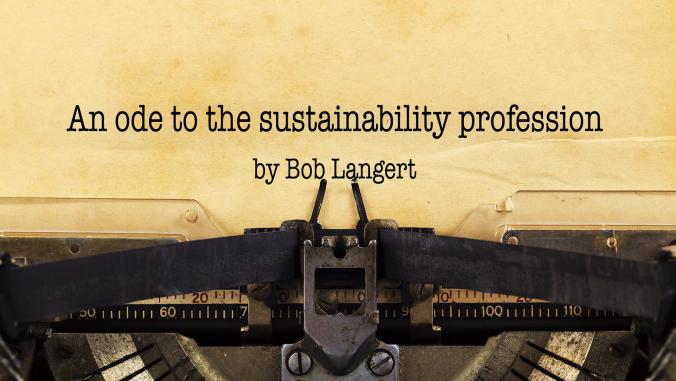10 minutes with Dave Stangis, Campbell Soup
What's the best piece of advice for up-and-comers in sustainability? This CSO reveals this and other master tips.

This column is about the people of sustainability. What makes them tick? What have they learned that works? What do they do for fun? First up is a good friend, Dave Stangis, VP corporate responsibility and chief sustainability officer at Campbell Soup Company.
Bob Langert: Why do you tweet so much?
Dave Stangis: It started as a way to communicate CSR and sustainability updates between reports. It evolved into a sharing and learning habit. I scan hundreds of news and topic summaries a day, and it's how I share. It has turned into a vehicle for me to try to help as many people as possible stay current on topics such as food systems, sourcing and technology.
Langert: Is it a burden to always be connected?
Stangis: There are times when I feel my brain is "at capacity," but in general it is a behavior that has now become second nature to how I work.
Langert: What's the No. 1 piece of advice you give up-and-comers that have aspirations to take your job?
Stangis: I tell them they need to learn at least one content area in a very deep way — preferably more than one. The goal is to develop expertise that is unique and valuable to the enterprise. To be honest, that can sound a little overwhelming to people, but I believe it is critical to advancing your company and your career. You focus on the job you have now, but you do it better than anybody else.
Langert: How do you escape sustainability — or do you, or should you?
Stangis: Get outside. Get in nature. Go for a walk. Go on a hike or run. Exercise. To free my brain at the end of the day, I've been trying to build a habit of reading before I go to bed at night so I can actually fall asleep.
Langert: What’s at your bedside now?
Stangis: Way too many books at the moment. I keep a few old favorites in the stack, but the book I’m finishing at the moment is "The Gene," by Siddhartha Mukherjee. Great content and a great storyteller. Up next is "The Hidden Life of Trees" and "The Seventh Sense."
Langert: Where do you draw inspiration?
Stangis: From the business world. I have to admit, I'm a capitalist at heart. Every day I read the paper and my head is full of ideas about company, marketplace and societal strategies. What value they're missing within their walls. What market they should be going after. I enjoy strategic conversations with the largest companies on the planet as well as start-up entrepreneurs.
Langert: You seem like you're really good at cutting through all of this bureaucratic stuff. What's your secret?
Part of the learning curve for any professional to figure out who actually has permission or needs permission to drive change.
Stangis: I work hard to find, and learn, and leverage the decision points in a company. There are 99 phantom decision points for every real decision point, in every company. I think part of the learning curve for any professional to figure out who actually has permission or needs permission to drive change.
Langert: You're a straight shooter. I think you're one of the best communicators out there. What tips do you have for others?
Stangis: First, thank you! I am often asked, what's the most important skill set to succeed in the CSR role? The first three answers are communications, communications and communications.
Several times early in my career I was thrown into a situation where I had to translate extremely complex, sometimes scary things into very simple and understandable language. I was forced into roles where I had to listen to people that were really, really outraged. This listening and translating, trial-by-fire helped me communicate better.
Langert: How do you get people to believe you, and be influenced by you?
Stangis: I’m not sure how to best describe this, but I'm a big believer in telling the truth no matter how uncomfortable it might be, or how difficult. You can be honest, constructive and diplomatic without being rude. I also believe you have to paint a visual picture of what success can look like.
Langert: For someone going to their first meeting with C-suite officers and they want to get their ear, what advice would you give them?
Stangis: No. 1, give them competitive information. Businesses are competitive. By the time people are in the C-suite, they're interested in what their business competition is doing. No. 2, you need to be able to translate the case you're trying to make in business terms. Why it makes sense for the enterprise — all the functions of the business and the P&L.
Langert: When you get knocked down and rejected on stuff that you're trying to advance, what gets you motivated to keep at it?
Stangis: I get knocked down more than I win arguments, but I'll have 15 arguments open at any one time.
I'll go back and find a different way to come at that one argument, but I got these 14 and perhaps five are really productive at the moment. I'm going to spend some time in these five, get my energy back up. Then go back in and fight the one I'm losing on.
Langert: How do you accept losing?
I think that losing is really a learning opportunity. There is a reason you lost or I lost.
Stangis: I think you have to lose. You have to ask people to tell you where you're wrong and you have to ask for real feedback. I think that losing is really a learning opportunity. There is a reason you lost or I lost.
There are times where I’ve advocated an approach that was probably too early. We may eventually end up there, five years, seven years later, but I lost going in.
Langert: So when are you the happiest?
Stangis: I'm happiest when there is kind of a flow, where people are on the same page and when things are laddering up to the company strategy. I’ve also been happiest when I've been able to give credit to others in the company I work for.
Langert: Do you think people that are trying to advance themselves should be bigger about asking for feedback, and really listening for it?
Stangis: They should actually seek it out, and be comfortable with it. The higher you go in an organization, the harder you need to seek real feedback. I’ve built an environment with my team where they know they’re expected to give me real feedback. We have some fun dialogs, yet we know we have each other’s back. We all have the experience of trying to provide feedback in the wrong environment or with an insecure person — that rarely goes well.





